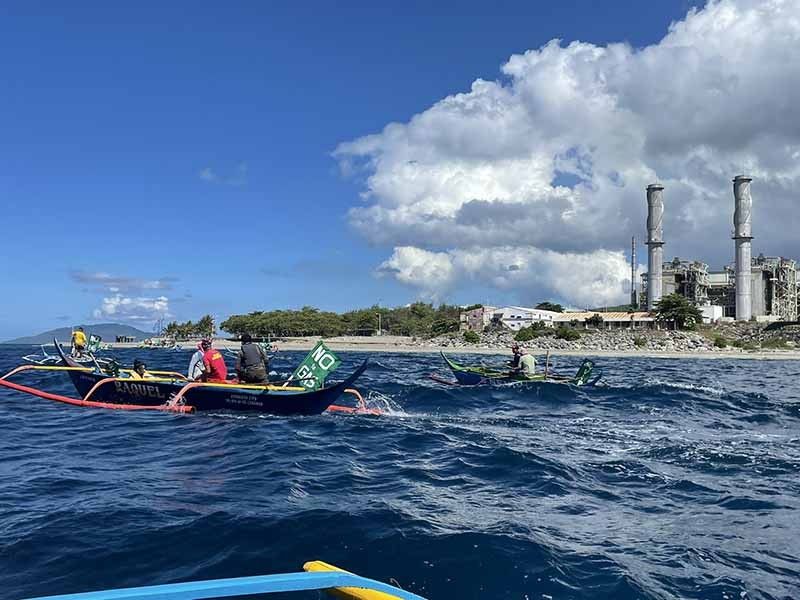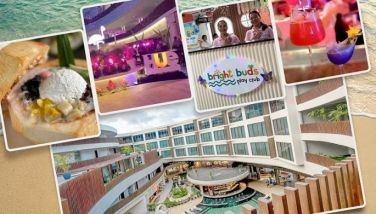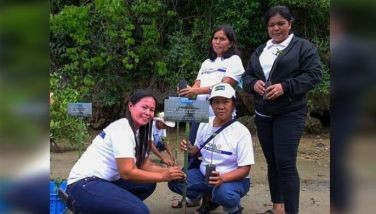'No space for fossil gas in Verde Island Passage or elsewhere'

MANILA, Philippines — Today is World Environment Day. More than being a celebration, it is a wake-up call to how humankind is continuously committed to destructive activities that threaten the health of the planet, our common home.
All the signs and science point to an undeniable reality: that human-induced rise of global temperatures is causing widespread disruption in nature and is affecting the lives of billions of people around the world.
In the last several years, global scientists and experts from the Intergovernmental Panel on Climate Change have been repeatedly warning us to brace for increasingly disastrous climate hazards, including those that will be irreversible, over the next two decades, if we don’t act with urgency. Time is ticking if we want to keep more catastrophic climate change at bay.
Despite such warnings — each more harrowing than the last — the world continues to rely on the single biggest cause of global warming for its power needs: fossil fuels. This is especially true for us who are living in the Southeast Asian region.
A new report from the Center for Energy, Ecology, and Development (CEED) and partners raised alarm over the massive expansion of fossil gas — a fossil fuel falsely labeled as a clean alternative to coal — in Southeast Asia.
Thanks to both local and international gas companies and financiers, we now have the highest concentration of gas power projects planned to be developed in the world. Ordinary folks like ourselves are told that plans to develop gas to this extent will help our status as developing nations, but in reality, it will only subject us to worse climate catastrophes, make our power bills even more unaffordable, and hurt the rich marine biodiversity found in our region and country.
This threat of destruction has hit close to home for me. My hometown of Oriental Mindoro is one of the five provinces — the rest being Batangas, Marinduque, Occidental Mindoro, and Romblon — that surround Verde Island Passage (VIP), an ecological hotspot at the heart of Southeast Asia’s Coral Triangle.
VIP is the most biodiverse marine habitat in the world and is even touted as the “Amazon of the oceans,” comparing it to the Amazon rainforest of Brazil, the most biodiverse rainforest in the world. It houses 60% of all the world’s known shore fish species, over 300 coral species, and thousands of other types of sea creatures.
This global wonder is at risk because of plans for massive development of fossil gas projects. In the last decade, the Philippines built and commissioned a large fleet of new coal-fired power plants, but civic movements, church, youth, communities, and Filipinos of all walks of life worked together to expose how dirty and devastating, not to mention costly, coal is.
Now, we are made to believe that gas is the cleaner alternative to coal, but the truth is so far from this. Gas is still a fossil fuel that accounts for a fifth of the world’s total carbon emissions. The drilling, extraction of fossil gas from wells, transportation in pipelines and ships, and all other processes involved in the life cycle of fossil gas - often referred to as natural gas — all lead to leaking high amounts of methane into the atmosphere — a greenhouse gas that is 34 times stronger than carbon dioxide at trapping heat over 100 years and 86 times stronger over 20 years.
In the Philippines, Batangas is the epicenter of this dangerous expansion. On top of five existing gas-fired plants, a fleet of eight proposed fossil gas and LNG power plant projects and seven new LNG terminals are to be built in the province, posing grave threats not just to biodiversity but to the health and livelihood of the communities in the area. There are two projects already in advanced stages of development — an LNG terminal of Linseed Field Power Corp. and Atlantic Gulf & Pacific Company, and an adjacent 1,750 MW gas plant of San Miguel Corp. Global Power.
The mere fact that such destructive developments are being constructed in the waters of VIP is an affront to our moral duty to protect the environment. Shouldn’t our rights to a clean, healthy, and sustainable environment be guaranteed by the government by prioritizing the communities that will be immediately and directly affected by fossil gas projects?
Fishermen in nearby barangays report fewer fish catch. They used to catch as much as 10 kilograms, which have dropped to two to three kilograms since Batangas’ transformation into a fossil gas hub. Their health and wellbeing are also under grave threat. In a marine ecology and water quality study conducted by CEED and Caritas Philippines as part of Protect VIP, a network of advocates for the protection of creation which I am also glad to be in, “very high” concentrations of toxic metals such chromium, copper, and lead have been detected along the coasts of Barangay Ilijan and Dela Paz in Batangas City where these fossil gas facilities are being built.
The whole pipeline of fossil gas projects still planned to be constructed in Batangas will further degrade the waters of VIP. How then, will fishermen make a living? What about those who rely on VIP for their sustenance? What will happen to life systems in other seas, to which new spawns of sea creatures from VIP also trickle on? It bears heavy in my heart to know that these impacts will also be mirrored by other communities and environments host to planned new fossil gas projects across the country.
It is unacceptable how developers and financiers of these projects peddle the idea that development can happen at the expense of the environment and people. A world with economic growth and environmental sustainability isn’t a utopia — it is attainable for as long as the desire to protect people and the environment is genuine.
Environmental protection itself contributes to economic growth. Our climate woes are worsened — and have reached this terrible state — because of economic growth tethered to greenhouse gas emitting industries and destructive practices.
As we work to protect the VIP, our oceans, and the world we call home from further degradation, we also must stand firm that there is no space for any more fossil fuels. The Church recently affirmed this in the Catholic Bishop Conference of the Philippines' 2022 Pastoral Statement on Ecology where we called for an end to financial services for coal, gas, and all fossil fuels. Last month's Ministerial Meeting of the United Nations' climate change conference of parties also came to the same conclusion with "clear collective determination to tackle the current energy crisis alongside the climate crisis, and to seize the opportunity for a clean energy transition."
Indeed, we need to continue fighting for an end to fossil gas, coal, and all other dirty energy, and hasten the shift to energy that can power a sustainable future.
——
Fr. Edwin Gariguez is a long term advocate for environmental justice and protection. In 2012, he was awarded with the Goldman Environmental Prize for his work with grassroots movements in resisting destructive mining in Mindoro. Having served for a decade as Executive Secretary of Caritas Philippines, where he led the advancement of various environmental initiatives and programs, Fr. Gariguez now continues his work as Social Action Director of the Apostolic Vicariate of Calapan, board member of CEED, and lead convenor of Protect VIP.
- Latest





























